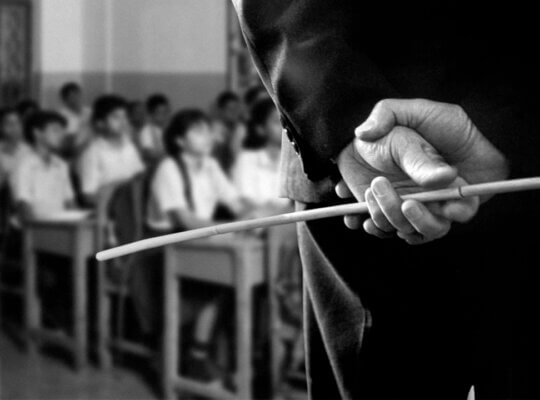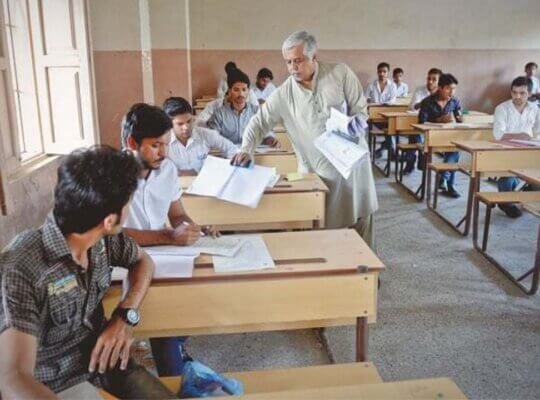KARACHI:
Off The School played host to a truly enlightening lecture and a reading session led by the esteemed poet and literary expert Ahmad Javaid earlier this week. As an accomplished exponent and critic of the Theater of the Absurd, Javaid has been sharing his extensive knowledge and understanding of this literary movement through a series of lectures on his YouTube channel.
His visit to the school was an opportunity for aficionados to thoroughly examine Samuel Beckett’s Krapp’s Last Tape and gain a deeper understanding of the Theater of the Absurd as a literary movement.
The Theater of the Absurd is a literary movement that emerged in the wake of World War II, characterised by a rejection of traditional narrative structures and themes and an emphasis on the meaninglessness and futility of human existence. The movement was a response to the sense of disillusionment and questioning of the purpose of life that arose after the war. Some of the key figures of the Theater of the Absurd include Samuel Beckett, Eugene Ionesco, and Harold Pinter.
Javaid provided an insightful introduction, contextualising the literary movement of the Theater of the Absurd and how it emerged as a response to the devastating impact of World War II on European society. He explained how the war led to a sense of disillusionment and questioning of the purpose and meaning of human existence.
Javaid highlighted the contributions of Beckett and Eugene Ionesco as the leading figures of the absurdist movement and how they elevated the genre of tragedy to new heights, blurring the lines between comedy and tragedy. He emphasised how these plays brought the concept of tragedy from an intellectual level to an existential level, highlighting the disconnection between thoughts and existence as the greatest tragedy that could befall human beings.
In Krapp’s Last Tape, Beckett explores the themes of memory, aging and the human condition through the character of Krapp, an old man who listens to recordings of his past self. The play is set in a room filled with tapes and equipment as Krapp listens to a tape recorded on his 39th birthday thirty years prior. Through the tape, we hear Krapp’s thoughts on his past, his regrets, and his hopes for the future. The play is a reflection on the human condition, as it explores the passage of time, the loss of memories, and the inevitability of death.
Javaid expertly highlighted the use of disconnected sentences, pauses and even seemingly incorrect phrases in the play and how these elements emphasised the futility of language and organised structures in our existence. He explained how the use of language in the play was a reflection of the futility of trying to make sense of the world and the human condition and how the play ultimately presents a bleak and pessimistic view of human existence.
Beckett’s Krapp’s Last Tape is considered a masterpiece of the Theater of the Absurd, and it’s a prime example of Beckett’s unique style of writing. Beckett was a key figure of the Theater of the Absurd, and his works are known for their use of minimalism, repetition, and a focus on the human condition. He was awarded the Nobel Prize in Literature in 1969 for his contributions to the Theater of the Absurd and his overall body of work.
At Javed’s session at “Off The School”, the audience was able to gain a deeper understanding of the literary movement of the Theater of the Absurd, the themes and style of Beckett’s writing, and how they correspond to the human condition. It was a reminder of the importance of continued learning and engagement with the arts.
Javaid is not only an expert on the Theater of the Absurd but also a unique scholar in Pakistan who creatively explains a wide range of literary and philosophical topics. He is well-known for his ability to connect seemingly disparate subjects and for his interdisciplinary approach, which combines philosophy, psychology, anthropology, religion, and literature in his lectures.
Javaid is particularly renowned for his in-depth analysis of the works of Rumi, Saadi, Sherazi, Meer Taqi Meer, Ghalib and other great poets of Persian and Urdu literature. He is able to provide a fresh perspective on these classic texts, drawing connections between literature and the human experience.
Javaid’s lectures on the Theater of the Absurd are uniquely intriguing, as they provide an understanding of the movement’s origins and how it reflects the human condition. He is able to draw parallels between the Theater of the Absurd and other literary and philosophical movements, highlighting how they intersect and influence each other. Javed’s lectures are a valuable resource for anyone interested in gaining a deeper understanding of these subjects and how they relate to the human experience.

Meet Najam Soharwardi, a Chevening Scholar and education advocate founded “Off The School” (OTS) to provide formal education to underserved communities.








